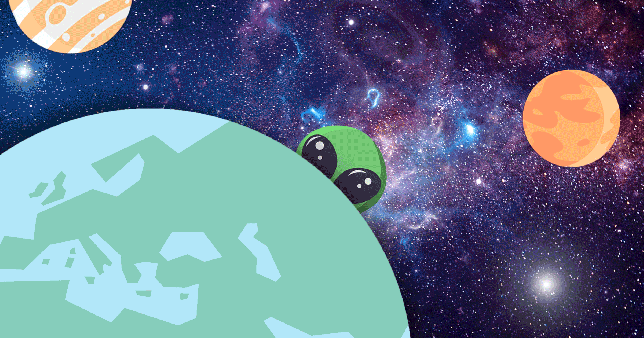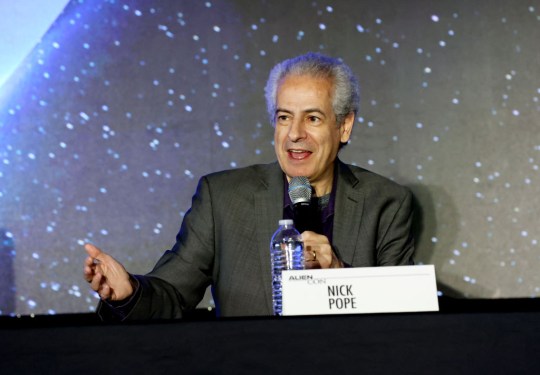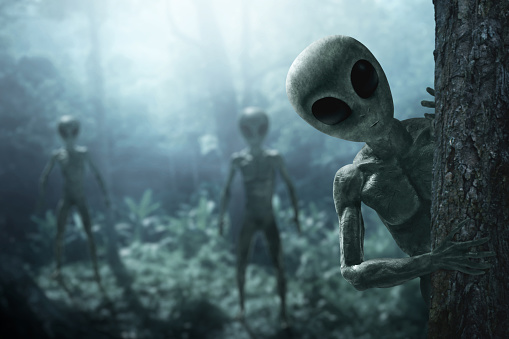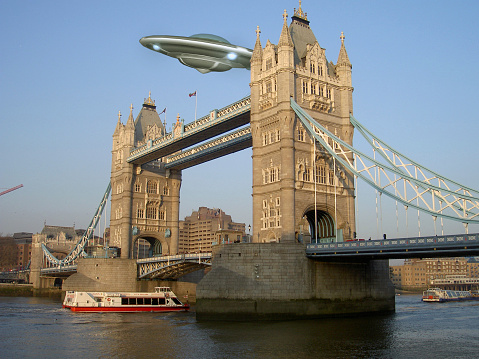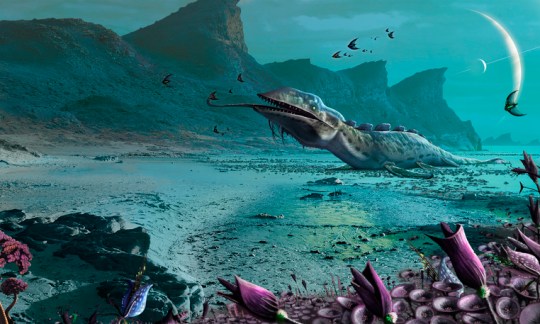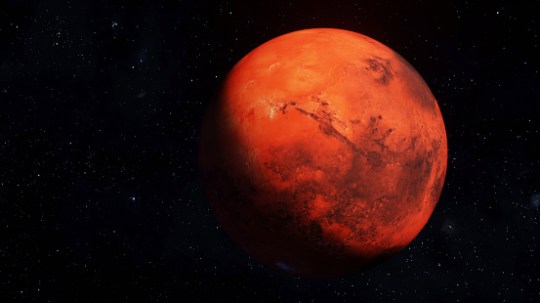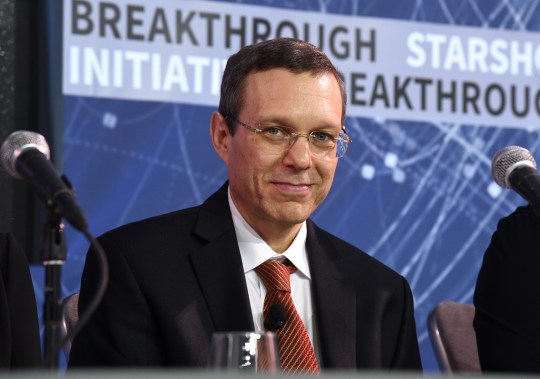We’re definitely going to find aliens this year.
That was the bold prediction of Dame Maggie Aderin-Pocock on Jools Holland’s popular New Year’s Hootenanny.
‘I think we’re going to discover alien life next year [in 2024],’ she said. ‘There’s definitely alien life out there.’
Such a bold prediction surely raised a few eyebrows, but coming from a well-known astronomer, on one of the biggest shows of the year, it may well have caused many to sit up and take notice.
The question of whether we are alone in the universe is almost as ancient as humanity itself. Now, with ongoing technological breakthroughs, expanding scientific knowledge and an ever-growing curiosity, the answer may come sooner than we think.
But let’s say we do find alien life. What happens next?
Surely there’s a meticulously crafted, internationally coordinated plan that will be quickly set in motion? Where experts in various fields converge to execute the next stage of a well-rehearsed protocol? With governments synchronising in a carefully orchestrated address to their respective nations telling their citizens ‘We are not alone’.
Well, spoiler alert. There is no plan.
Some governments and scientific bodies may have a vague idea, but nothing has been widely shared or agreed upon. So when the news does come, it will get messy.
This lack of attention is a source of frustration for Nick Pope, an expert on the matter as a former civilian UFO investigator for the Ministry of Defence.
‘Frustratingly there isn’t really a plan, which is a huge mistake because it’s the ultimate low probability, high impact scenario,’ he says. ‘The easiest thing to do is try to make a joke of it and move on – and hope no one notices the fact that there is this glaring black hole in your policy that you don’t have a plan for.’
And yet while governments have contingencies for things such as pandemics and extreme weather events, a first contact event has been almost entirely overlooked.
‘This is going to deeply and profoundly impact every aspect of our lives: politics, religion, science, technology, the economy, and much more besides,’ Nick says. ‘Who announces it? What do we say? If it’s a message, do we reply? This is something that needs to be addressed as a matter of urgency.’
And, like us (hopefully), he is not alone.
Daniela De Paulis is the founder and director of A Sign In Space, a collaboration with the European Space Agency, Search For Extra Intelligence (SETI) Institute, the Greenbank Observatory and other observatories around the world.
‘If we ever discover a signal from an alien civilization, I think it would be very hard to control,’ she says. ‘News of a discovery would most likely make its way around the world and would probably be leaked to the media very quickly. Once the media has started communicating the discovery, society will interpret in ways that are still unknown.’
De Paulis believes that a gradual educational approach from the media and academics in tandem, which communicates the research and developments in accessible ways and normalises the subject, might fill the gap left by governments’ lacklustre approach to the subject.
However, she acknowledges there is no ‘one size fits all’ solution.
‘In my opinion, no matter how much we prepare, it will be a scenario that will play out with its own rules at the time when it happens,’ she says.
At this moment in time, the only thing remotely close to a plan is the Declaration of Principles (DOP), put together by the International Academy of Astronautics (IAA).
The DOP is a set of general guidelines proposed for how humanity should approach the potential discovery of extraterrestrial life. At its core, the DOP emphasises international cooperation and scientific rigour and openness.
However, as Nick explains, although it’s welcome, the DOP may not be a particularly helpful framework for governments.
‘The Declaration of Principles really says little more than if we pick up a radio signal, we should try to verify it with a second radio telescope, then peer review the data and then publish the data and tell everyone,’ he says. ‘That’s not particularly helpful in government terms.’
‘Finding alien life would unite us’
If Hollywood has taught us anything, finding alien life could bring humanity together – albeit hopefully in more of a philosophical way, rather than to fight a hostile invasion.
Bill Diamond, president and CEO of the SETI Institute, certainly hopes so.
‘You don’t see politics, boundaries and ethnicities from space,’ he says. ‘Maybe such a discovery would offer us a different perspective on what it’s like to be human.’
Bill is optimistic that an announcement could trigger a sweeping change in how people live their lives and treat each other.
‘The discovery of intelligent life beyond Earth could be the moment in human history that helps us unite as a species rather than continuously divide us,’ he says. ‘In order to solve the types of challenges we face we’re going to have to come together as a species on this planet and act as one.’
In the UK, however, it does seem that the tide is slowly beginning to turn, as individuals in positions of power start to pose the tough questions.
In December, at a science, innovation and technology committee, MP Stephen Metcalfe asked Michelle Donelan, the secretary for science, Innovation and Technology about how a discovery would be communicated with the public if we were ‘to find life, in whatever form’.
Donelan, in response, said ‘it’s taken appropriately seriously’ and a communication plan ‘would depend on the exact specifics… and would be a cross-government undertaking with particular Cabinet Office involvement’.
Sitting next to Donelan in the committee room, Sarah Munby, permanent secretary at the department for science, innovation and technology revealed there’s ‘a small effort within our space team looking at the question of how we would handle such an announcement’.
Progress perhaps, if entirely devoid of specifics.
Yet it is also worth noting that Mr Metcalfe opened his line of enquiry with ‘I’m slightly loath to ask these questions’. Talk of aliens, little green men or otherwise, is still often met with widespread scepticism – more so when it comes to UFOs, rather than microbes in deep space.
But as Nick found, there are questions to be answered.
‘It wasn’t all just misinformation, hoaxes or delusions,’ he says. ‘When we had our own pilots seeing these things, when we simultaneously had them tracked on radar and when they were performing speeds, manoeuvres and accelerations that seemed to go far beyond anything we had, I began to change my mind and think there was something strange going on in our skies.’
Nick worked at the Ministry of Defence for 21 years, spending four of those on the UFO desk. Recently, he has noticed the start of a tone change, at least on his side of the Atlantic in the US.
‘The way that this subject has come from fringe to mainstream, there is still a giggle factor with some of this,’ he says. ‘We’ve gone literally from a situation where this was discussed in terms of science fiction, conspiracy theory and fringe science, to where it is now, in the US at least, front and centre.
‘I think there’s a growing consensus that it’s only a matter of time before we find alien life.’
Dr Avi Loeb, a Harvard professor and former member of the President’s council on science and technology, agrees.
‘It’s really extremely arrogant of us to think we are alone,’ he says.
‘The real thrill for me is to find an intelligent partner out there, a neighbour that is smarter than us that we can learn from and I think in the coming years there’s a chance that we can find it’
Professor Loeb has been making headlines of late following a high-profile expedition in the Pacific, where he claims to have found interstellar material from a meteorite which passed through Earth’s atmosphere and crashed into the sea on January 8, 2014.
While the jury is still out for many, the global interest in his work highlights just how big an impact confirming, 100%, that life out there exists would have.
‘We need to get lots of people thinking about this,’ says Nick. ‘This is a truly multidisciplinary subject.
‘So not just government planners, but psychologists, philosophers, psychiatrists and, you know, the other seven or eight billion people on the face of the planet.’
MORE : Men are becoming less fertile – and we may finally know why
MORE : Zig-zagging UFO spotted hovering above a nuclear power plant
MORE : The scrotum frog has landed in London
Get your need-to-know
latest news, feel-good stories, analysis and more
This site is protected by reCAPTCHA and the Google Privacy Policy and Terms of Service apply.

